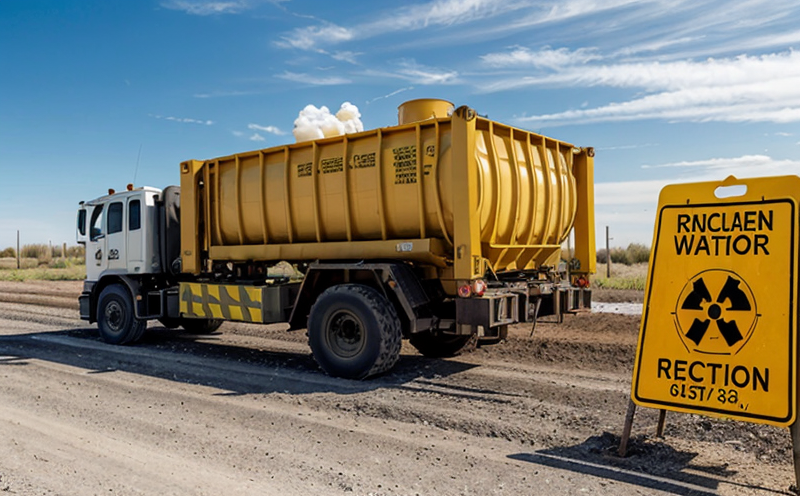ASTM D7282 Radiological Survey of Nuclear Waste Sites
The ASTM D7282 standard provides a methodology for conducting radiological surveys at nuclear waste sites. This service is critical in ensuring the safe and compliant disposal, handling, and management of radioactive materials. The primary objective of this test is to determine the presence and concentration levels of radionuclides within the site.
The ASTM D7282 procedure involves a series of steps aimed at identifying and quantifying radiological contamination. It specifies the use of appropriate equipment such as Geiger counters, scintillation detectors, and gamma ray spectrometers to measure radiation levels. Specimens collected from various points within the site are analyzed for radionuclide content.
When performing an ASTM D7282 radiological survey, it is essential to follow strict protocols to ensure accurate data collection. This includes establishing a sampling plan that covers all relevant areas of concern. The samples must be representative and taken at locations identified as having potential contamination levels. Proper handling procedures are also crucial for preventing cross-contamination during the process.
The results obtained from this survey play a vital role in assessing compliance with regulatory requirements set forth by organizations like the International Atomic Energy Agency (IAEA) and national bodies such as NRC or Euratom. By adhering to these guidelines, laboratories can provide reliable data that helps stakeholders make informed decisions regarding waste management practices.
Accurate radiological surveys not only assist in meeting legal obligations but also contribute significantly towards minimizing risks associated with improper disposal methods. They help identify areas requiring remediation and support decision-making processes related to decommissioning projects or long-term storage solutions for nuclear materials.
In summary, the ASTM D7282 radiological survey is a fundamental tool used in managing radioactive waste sites effectively. Its comprehensive approach ensures that all relevant aspects of radiation exposure are accounted for, thereby enhancing safety standards across industries dealing with hazardous substances.
Benefits
The implementation of ASTM D7282 radiological surveys offers numerous advantages to organizations involved in managing nuclear waste. One key benefit is the ability to ensure compliance with regulatory requirements by providing precise measurements of radionuclide concentrations within specified limits.
- Promotes Safety: By identifying potential hotspots early on, facilities can take preventive measures to avoid accidents or breaches that could lead to harmful radiation exposure.
- Enhances Reputation: Demonstrating adherence to international standards like ASTM D7282 shows commitment to responsible practices and builds trust among clients and regulatory bodies alike.
- Supports Decision-Making: Accurate data from these surveys assists in making informed choices about treatment methods, storage solutions, and disposal strategies for nuclear materials.
- Reduces Risks: Early detection of contamination allows for targeted interventions before they escalate into larger issues, reducing long-term liabilities associated with non-compliance or environmental damage.
The benefits extend beyond mere compliance; they contribute to a safer working environment and more sustainable practices within the nuclear industry. Organizations that invest in thorough radiological surveys are better positioned to navigate complex regulatory landscapes while maintaining high ethical standards.
Eurolab Advantages
At Eurolab, we pride ourselves on offering unparalleled expertise in ASTM D7282 radiological survey services. Our team of highly qualified professionals ensures that every aspect of the testing process adheres strictly to international standards.
- Comprehensive Knowledge: With years of experience in handling nuclear materials and conducting detailed surveys, our staff remains up-to-date on all relevant regulations and best practices.
- State-of-the-Art Equipment: Leveraging advanced detection instruments allows us to achieve highly accurate readings even from small sample sizes. This precision is crucial for ensuring reliable results.
- Dedicated Resources: We allocate dedicated personnel and resources specifically for ASTM D7282 projects, guaranteeing consistent quality throughout the entire process.
- Customized Solutions: Understanding that each project has unique needs, Eurolab offers tailored approaches based on client requirements. Whether it's a one-off survey or ongoing monitoring program, we adapt our services accordingly.
Moreover, our commitment to excellence extends beyond just technical proficiency; it encompasses ethical considerations too. We prioritize safety at every stage of the process and strive to minimize any adverse impacts on the environment during our operations.
Frequently Asked Questions
Environmental and Sustainability Contributions
The ASTM D7282 radiological survey plays a crucial role in promoting environmental sustainability by ensuring proper management of nuclear waste sites. Through accurate identification and quantification of radionuclides, this service helps minimize the risk of accidental releases into the environment.
- Reduces Contamination Spread: Early detection allows for prompt containment measures, preventing further spread of radioactive materials beyond designated boundaries.
- Maintains Ecosystem Integrity: By identifying and addressing contamination hotspots promptly, organizations contribute to preserving local ecosystems.
- Promotes Responsible Practices: Compliance with ASTM D7282 demonstrates a commitment to responsible stewardship of natural resources.
In conclusion, the ASTM D7282 radiological survey is an indispensable tool in safeguarding both human health and the environment. Its application ensures that nuclear waste sites are handled safely and sustainably, contributing positively towards broader sustainability goals.





